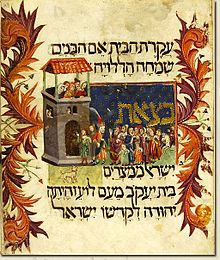Our website is made possible by displaying online advertisements to our visitors.
Please consider supporting us by disabling your ad blocker.
Pesachim
 | |
| Tractate of the Talmud | |
|---|---|
| Seder: | Moed |
| Number of mishnahs: | 89 |
| Chapters: | 10 |
| Babylonian Talmud pages: | 121 |
| Jerusalem Talmud pages: | 71 |
Pesachim (Hebrew: פְּסָחִים, lit. "Paschal lambs" or "Passovers"), also spelled Pesahim, is the third tractate of Seder Moed ("Order of Festivals") of the Mishnah and of the Talmud. The tractate discusses the topics related to the Jewish holiday of Passover, and the Passover sacrifice, both called "Pesach" in Hebrew. The tractate deals with the laws of matza (unleavened bread) and maror (bitter herbs), the prohibitions against owning or consuming chametz (leaven) on the festival, the details of the Paschal lamb that used to be offered at the Temple in Jerusalem, the order of the feast on the first evening of the holiday known as the Passover seder, and the laws of the supplemental "Second Pesach".[1][2]
Two reasons are given for the name of the tractate Pesachim being in the plural: either because the tractate originally comprised two parts, one dealing with the Passover sacrifice, and the second with the other aspects of the holiday, before they were combined into a single tractate named Pesachim during the Geonic period (by 1040 CE), or, because the tractate deals with the two occasions for offering the Passover sacrifice, namely, the 14th of the month of Nisan on the eve of the holiday, and one month later, the "second Pesach" on the 14th of Iyar for those who were unable to offer the sacrifice on the original date.[2][3]
The basis for the laws included in this tractate are derived from the Torah, largely from the Book of Exodus, in Exodus 12:1-29, Leviticus 23:5-8, Exodus 13:3-10 and Exodus 23:15-18, as well as Leviticus 23:5-8, Numbers 9:2-14 and Numbers 28:16-25, and Deuteronomy 16:1-8.[4]
The tractate consists of ten chapters and has a Gemara – rabbinical analysis of and commentary on the Mishnah – in both the Babylonian and Jerusalem Talmud. There is also a Tosefta for this tractate.[3]
Apart from the Passover sacrifice, the Jewish religious laws derived from this tractate regarding Passover have continued to be observed, with minor variations according the interpretations of later halakhic authorities, by traditional Jewish communities since ancient times until the present. The observances include the prohibitions on eating, benefiting from or possessing any leaven, and the sale or search for and removal of leaven from the house before Passover; the practices of the Seder night, including eating matza and bitter herbs, drinking four cups of wine, and reciting the Haggadah recalling the Exodus from Egypt; as well as the observances of the entire holiday, including the eating of matza and the recitation of the Hallel prayer.[5]
- ^ Steinsaltz, Adin (2013). "Tractates of the Mishna and the Talmud". Reference Guide to the Talmud. Koren. p. 63. ISBN 978-1-59264-312-7.
- ^ a b Kornfeld, Mordecai. "Introduction and Bibliography for Pesachim". dafyomi.co.il. Kollel Iyun Hadaf of Yerushalayim. Retrieved 2019-02-03.
- ^ a b Ehrman, Arnost Zvi (1978). "Pesahim". Encyclopedia Judaica. Vol. 13 (1st ed.). Jerusalem, Israel: Keter Publishing House Ltd. pp. 327–328.
- ^
 One or more of the preceding sentences incorporates text from a publication now in the public domain: Singer, Isidore; et al., eds. (1901–1906). "Pesaḥim". The Jewish Encyclopedia. New York: Funk & Wagnalls.
One or more of the preceding sentences incorporates text from a publication now in the public domain: Singer, Isidore; et al., eds. (1901–1906). "Pesaḥim". The Jewish Encyclopedia. New York: Funk & Wagnalls.
- ^ Steinsaltz, Adin (2013). "Halakhic Concepts and Terms: Moed". Reference Guide to the Talmud. Koren. pp. 276–277. ISBN 978-1-59264-312-7.
Previous Page Next Page


